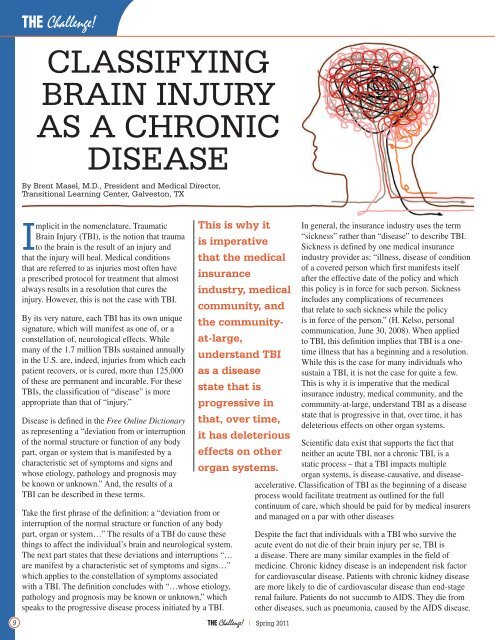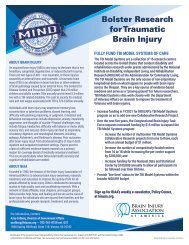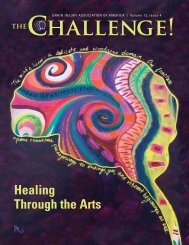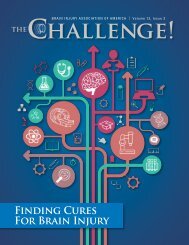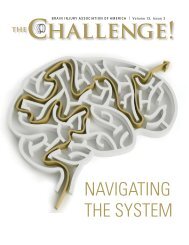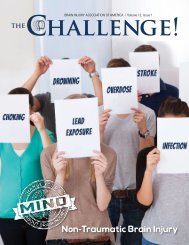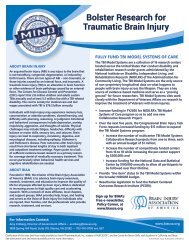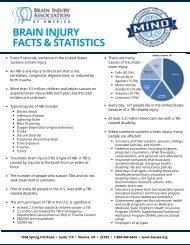THE Challenge! Spring 2011
Communication
Communication
Create successful ePaper yourself
Turn your PDF publications into a flip-book with our unique Google optimized e-Paper software.
<strong>THE</strong> <strong>Challenge</strong>!<br />
Classifying<br />
Brain Injury<br />
as a Chronic<br />
Disease<br />
By Brent Masel, M.D., President and Medical Director,<br />
Transitional Learning Center, Galveston, TX<br />
9<br />
Implicit in the nomenclature, Traumatic<br />
Brain Injury (TBI), is the notion that trauma<br />
to the brain is the result of an injury and<br />
that the injury will heal. Medical conditions<br />
that are referred to as injuries most often have<br />
a prescribed protocol for treatment that almost<br />
always results in a resolution that cures the<br />
injury. However, this is not the case with TBI.<br />
By its very nature, each TBI has its own unique<br />
signature, which will manifest as one of, or a<br />
constellation of, neurological effects. While<br />
many of the 1.7 million TBIs sustained annually<br />
in the U.S. are, indeed, injuries from which each<br />
patient recovers, or is cured, more than 125,000<br />
of these are permanent and incurable. For these<br />
TBIs, the classification of “disease” is more<br />
appropriate than that of “injury.”<br />
Disease is defined in the Free Online Dictionary<br />
as representing a “deviation from or interruption<br />
of the normal structure or function of any body<br />
part, organ or system that is manifested by a<br />
characteristic set of symptoms and signs and<br />
whose etiology, pathology and prognosis may<br />
be known or unknown.” And, the results of a<br />
TBI can be described in these terms.<br />
Take the first phrase of the definition: a “deviation from or<br />
interruption of the normal structure or function of any body<br />
part, organ or system…” The results of a TBI do cause these<br />
things to affect the individual’s brain and neurological system.<br />
The next part states that these deviations and interruptions “…<br />
are manifest by a characteristic set of symptoms and signs…”<br />
which applies to the constellation of symptoms associated<br />
with a TBI. The definition concludes with “…whose etiology,<br />
pathology and prognosis may be known or unknown,” which<br />
speaks to the progressive disease process initiated by a TBI.<br />
This is why it<br />
is imperative<br />
that the medical<br />
insurance<br />
industry, medical<br />
community, and<br />
the communityat-large,<br />
understand TBI<br />
as a disease<br />
state that is<br />
progressive in<br />
that, over time,<br />
it has deleterious<br />
effects on other<br />
organ systems.<br />
<strong>THE</strong> <strong>Challenge</strong>! | <strong>Spring</strong> <strong>2011</strong><br />
In general, the insurance industry uses the term<br />
“sickness” rather than “disease” to describe TBI.<br />
Sickness is defined by one medical insurance<br />
industry provider as: “illness, disease of condition<br />
of a covered person which first manifests itself<br />
after the effective date of the policy and which<br />
this policy is in force for such person. Sickness<br />
includes any complications of recurrences<br />
that relate to such sickness while the policy<br />
is in force of the person.” (H. Kelso, personal<br />
communication, June 30, 2008). When applied<br />
to TBI, this definition implies that TBI is a onetime<br />
illness that has a beginning and a resolution.<br />
While this is the case for many individuals who<br />
sustain a TBI, it is not the case for quite a few.<br />
This is why it is imperative that the medical<br />
insurance industry, medical community, and the<br />
community-at-large, understand TBI as a disease<br />
state that is progressive in that, over time, it has<br />
deleterious effects on other organ systems.<br />
Scientific data exist that supports the fact that<br />
neither an acute TBI, nor a chronic TBI, is a<br />
static process – that a TBI impacts multiple<br />
organ systems, is disease-causative, and diseaseaccelerative.<br />
Classification of TBI as the beginning of a disease<br />
process would facilitate treatment as outlined for the full<br />
continuum of care, which should be paid for by medical insurers<br />
and managed on a par with other diseases<br />
Despite the fact that individuals with a TBI who survive the<br />
acute event do not die of their brain injury per se, TBI is<br />
a disease. There are many similar examples in the field of<br />
medicine. Chronic kidney disease is an independent risk factor<br />
for cardiovascular disease. Patients with chronic kidney disease<br />
are more likely to die of cardiovascular disease than end-stage<br />
renal failure. Patients do not succumb to AIDS. They die from<br />
other diseases, such as pneumonia, caused by the AIDS disease.


